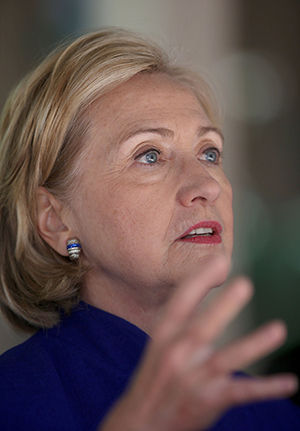Clinton urges State Dept. to release her emails

Former Secretary of State Hillary Rodham Clinton speaks during a news conference after a roundtable meeting at the Children’s Hospital Oakland Research Institute in Oakland, Calif., on Wednesday, July 23, 2014.
Hillary Rodham Clinton urged the State Department to release the emails she wrote from a private email account as secretary of state, weighing in on a controversy that has generated negative attention this week for the likely Democratic presidential candidate.
In a tweet late Wednesday, Clinton said, “I want the public to see my email. I asked State to release them. They said they will review them for release as soon as possible.”
State Department spokeswoman Marie Harf said in response to Clinton’s tweet that the department will review for release the emails Clinton provided. Harf said it could take some time to review.
Secretary of State John Kerry said Thursday, “… we will undertake this task as rapidly as possible in order to make sure that we are dealing with the sheer volume in a responsible way.
Speaking in Riyadh, Saudi Arabia, Kerry was asked if the department should look at emails outside those already provided by Clinton. He said he thought the department had all the emails related to the State Department but said he would check.
Clinton’s public comments Wednesday came after she didn’t address the matter during a speech on Tuesday, and she still hasn’t explained why she used her own server and eschewed a State Department email address.
Her use of a personal email account for State Department business has prompted questions about her transparency, and Republicans criticized her over it.
The top Democrat on the House committee investigating the fatal 2012 Benghazi, Libya, attacks praised Clinton’s call for State to release her emails.
“As far as I am aware, no other Cabinet secretary in history has ever called for the release of his or her emails — in their entirety and throughout his or her tenure,” said Rep. Elijah Cummings of Maryland, who noted that last year the State Department provided 55,000 pages of documents and last month submitted 800 pages of emails to the committee related to Benghazi.
At the White House Thursday, a person familiar with the matter said the counsel’s office there was not aware at the time Clinton was secretary of state that she relied solely on personal email, and found out only as part of the congressional investigation into the Benghazi attack.
The person said Clinton’s exclusive reliance on personal email as the nation’s top diplomat was inconsistent with the guidance given to agencies that official business should be conducted on official email accounts. Once the State Department turned over some of her messages in connection with the Benghazi investigation after she left office, making it apparent she had not followed the guidance, the White House counsel’s office asked the department to ensure that her email records were properly archived, according to the person who spoke on a condition of anonymity without authorization to speak on the record.
The chairman of the House Oversight and Government Reform Committee, Utah Republican Jason Chaffetz, plans to investigate whether Clinton may have violated federal requirements that written communications of officials are preserved. The committee will join with a special committee investigating the 2012 attacks in Benghazi, Libya, which issued subpoenas Wednesday for Clinton’s emails when she was secretary of state.
Since the revelations surfaced this week, the Obama administration has been pummeled by endless questions about Clinton, who hasn’t formally announced a run. In the absence of an official campaign to defend her, the White House press secretary has been put in the awkward position of being a de facto Clinton spokesman and the most public voice speaking on her behalf.
Clinton’s team said this week she acted no differently from her predecessors at the State Department who also used private email addresses.
Last year, Clinton provided the State Department with the 55,000 pages of emails after the department asked her and other former secretaries for records that should be preserved. Yet her team alone decided what would be turned over and should not, without any outside control or clarity on how those decisions were made.


